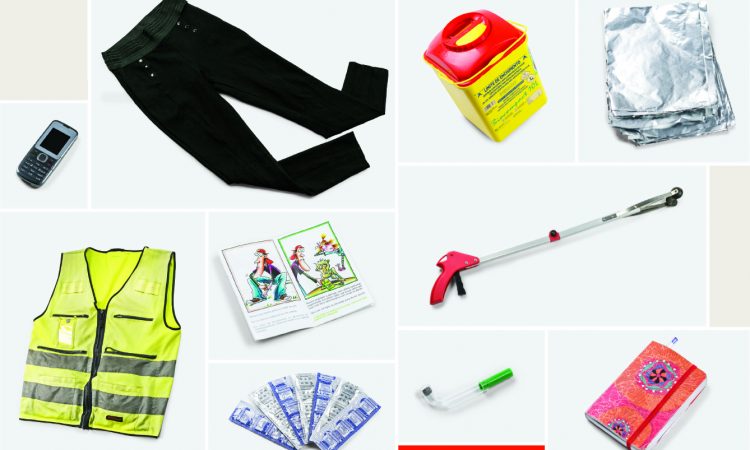It’s almost midnight when Marta Nascimento strides up to a young sex worker and her john who are loitering in Martim Moniz, Lisbon’s red-light district. Nascimento opens her backpack, which is brimming with syringes, aluminum foil, and crack pipes. The sex worker only asks for condoms, though—she doesn’t need drug paraphernalia tonight. Confused, the john asks if Nascimento is carrying. “She doesn’t sell drugs,” the sex worker explains, “just distributes the material to do them.”
Zipping up the backpack after handing the woman several condoms, Nascimento interjects to correct her: “It’s to make doing drugs less risky.” She always has back-up.
A 37-year-old psychologist by training, Nascimento works for a public health organization, Crescer na Maior, which facilitates needle and pipe exchanges among Lisbon’s drug users. The group’s methods reflect Portugal’s unique drug policies: In 2001, the country became the first in the world to decriminalize personal use of all narcotics. Dealing and trafficking is still illegal, but individuals are allowed to possess small amounts—up to two grams of cocaine, for example—
without running afoul of law enforcement. The government has also invested in harm-reduction initiatives for addicts, including methadone programs, treatment centers, and needle exchanges. (Crescer na Maior is partially state-funded.) The results have been significant: From 2001 to 2014, the number of new HIV cases among drug users fell from 518 to just 42.
Not everyone supports the government’s approach. Nascimento has been harassed and had bottles thrown at her for what some Portugal residents termed “enabling drug use.” Yet she sees her work through a pragmatic lens. “There is no such thing as a drugs-free world. Some people will always turn to substances to fix their problems,” Nascimento told FOREIGN POLICY in October. “This way, we’re improving their lives.”
***
Plastic container – Used needles can pass HIV or hepatitis, and the frequency of transmission is a real health crisis. When we visit neighborhoods, users deposit old spikes into the containers and take the new ones we give them. Once they’re full, we burn the containers as a safety precaution.
Notepad — Once I’m out of sight, I write down pertinent information: the patient’s medical issues, how many new needles were exchanged. I don’t write in front of them because they’ll be suspicious that I’m sharing information with the police or a doctor, which we never do. Personal information is confidential, but the general data help us apply for government funding each year.
Cellphone — I have a work phone and give the number out to anyone who wants it. Users call when they need new needles, help getting a doctor’s appointment, or a safe place to stay the night. One of my patients used to call frequently threatening suicide. He’s in an addiction rehabilitation program now.
Safety vest — I often work in the evening, so this helps drug users recognize me. I have to be careful, though, because police look out for it, too. Even though personal drug use is not a crime in Portugal, users complain about police brutality. I try my best to avoid meeting users if police are in the area. I don’t want to draw unwanted attention to my patients.
Pants — Sometimes I have to pick up used needles off the ground. I always cover my legs to keep from getting stabbed. In summer, I wear loose satin trousers. In winter, I prefer leggings or jeans.
Informational pamphlet — We pass out these flyers, which show the safest way to inject drugs. I don’t ever judge users on their methods, but I do try to explain that certain areas of the body present greater risk. For example, shooting into your legs increases the risk of stroke.
Crack pipe — In addition to syringes and aluminum foil, I give pipes to crack users, too. They have complained about the pipe design, which they say is difficult to smoke and clean because the metal holder is too tight and difficult to remove. I came up with a competition: Whoever finds a way to remove the metal holder more easily gets $55.
Tongs — I used to just wear latex gloves when picking up syringes and other trash from the street. Now I also use these tongs. They were a gift from one of my patients. He, like many users, collects scrap metal to make a little money. He found these and thought of me.
Condoms — STDs are a huge problem in the drug-user community. They become an even bigger issue when users make money doing sex work. People need the means to engage in safe intercourse. I always give them condoms and, if they ask for it, lube, which can minimize vaginal tearing and bleeding that make the body more vulnerable to infection.
Aluminum foil — We give foil to people who smoke heroin rather than shoot it. Some users are surprised we hand out the sheets and not just the new needles, but we do it. Used aluminum foil is more dangerous to smoke with because it releases more toxins.





